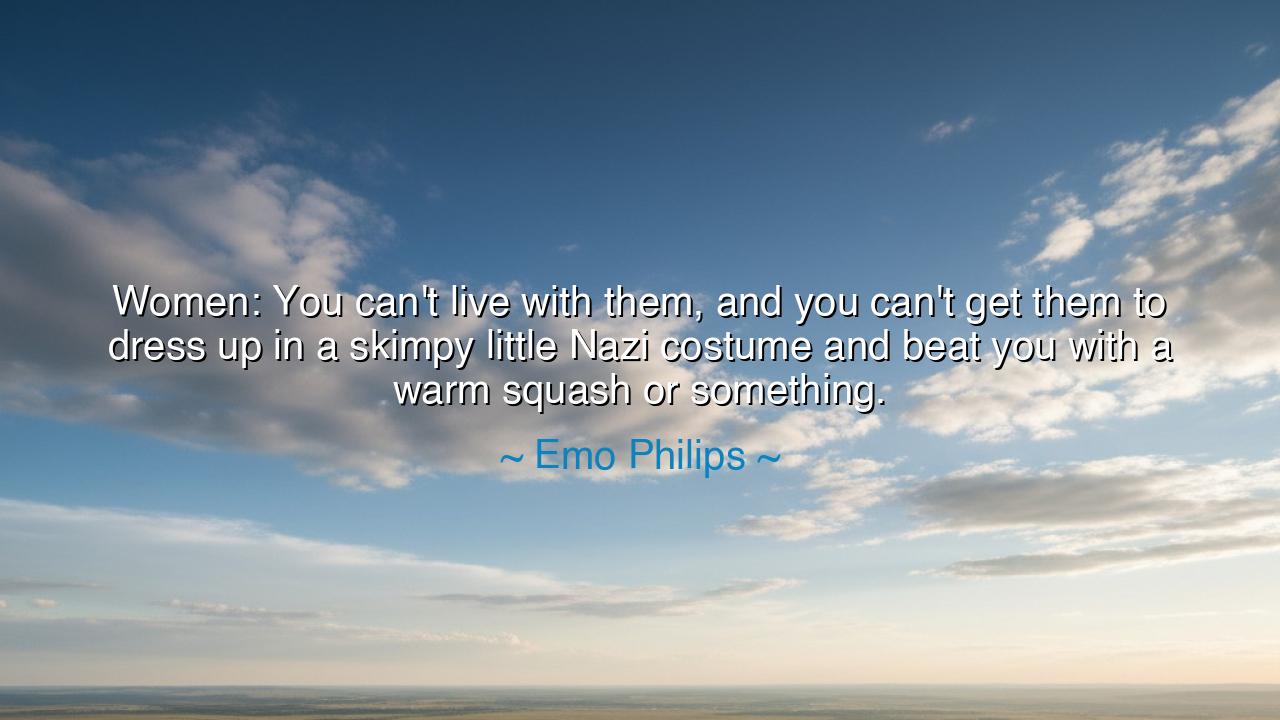
Women: You can't live with them, and you can't get them to dress
Women: You can't live with them, and you can't get them to dress up in a skimpy little Nazi costume and beat you with a warm squash or something.






The words of Emo Philips, though clothed in the garments of absurdity, conceal a deeper wisdom about the mystery of women and the strangeness of human longing: “Women: You can’t live with them, and you can’t get them to dress up in a skimpy little Nazi costume and beat you with a warm squash or something.” At first glance, it is laughter, a jest meant to bewilder. Yet in its exaggeration lies a timeless truth—the eternal tension between desire and reality, between the expectations men place upon women and the unpredictable nature of love itself.
From the ancients we hear echoes of this struggle. The poets of Greece sang of Aphrodite, goddess of love, whose blessings brought both joy and torment. Men dreamed of her favors, yet trembled at her power, for no one could master the heart of woman. Philips, through humor, points to the same paradox: man cannot live without woman, yet he cannot bend her wholly to his whimsical desires. To seek to do so is to fall into folly, as his comic image reveals.
Consider the tale of Mark Antony and Cleopatra. Antony, mighty general of Rome, could command armies and conquer kingdoms, yet in the presence of Cleopatra, he was undone. She would not bend to his command, but instead drew him deeper into her will, into her pageantry, into her games of power and seduction. Was this not the same truth Philips makes mock of—that woman is not the servant of man’s fantasies, but a force of her own, who shapes the story as much as he?
The mention of the costume and the squash is not meant as literal desire but as a symbol of the absurd extremes to which human longing may travel. In humor’s mirror, we see our own strangeness: how often men and women seek from each other things that cannot, and perhaps should not, be given. The laughter arises not only from the ridiculousness of the request, but from the recognition that we, too, are creatures of contradictions, asking love to fulfill both noble and foolish dreams.
Let the generations remember: humor is not the enemy of wisdom, but its companion. In Philips’s wild and comic vision, we are reminded that the bond between men and women is filled with paradoxes, frustrations, and delights. It cannot be reduced to control, nor to fantasy, but must be embraced in all its mystery. For though we laugh at the absurdity, the laughter itself teaches us—love is never simple, never tamed, and therein lies its eternal power.






DHDuy hung
Emo Philips seems to be using hyperbole and absurdity to make a point, but the imagery in this quote feels like it crosses into offensive territory. The reference to Nazi costumes and violence is jarring, and I can’t help but question whether this is truly funny or just an excuse to make a shocking statement. Should humor have limits, and if so, where do we draw the line with such sensitive topics?
TDtien dat
This quote from Emo Philips is an interesting and somewhat disturbing way to talk about relationships. It sounds like an attempt at humor, but it feels uncomfortable and inappropriate, especially with the reference to the Nazi costume and violence. Is this just edgy humor, or is it crossing a line by trivializing serious issues? How much is too much when it comes to making jokes about relationships and gender?
Ffakebokeo
While the quote may seem like a humorous exaggeration, I’m left wondering if this is just an attempt at humor gone too far. Is there a deeper meaning here about the struggle or tension in relationships between men and women? Or does it reduce women to stereotypes for the sake of shock value? Can humor like this really contribute to a more meaningful discussion about gender or is it just harmful?
MNminh nguyen
Emo Philips' quote is certainly provocative, but it feels more like a dark humor attempt than a genuine commentary on women. The extreme nature of the imagery seems to push boundaries, making me wonder if the joke is intended to highlight the absurdity of gender dynamics in a very exaggerated way. Is this kind of humor really helping the conversation, or is it just reinforcing problematic stereotypes?